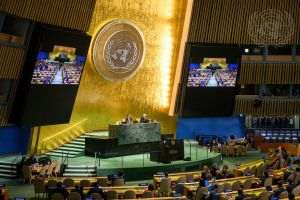The future strength of the global economy has taken a mixed picture over the past year, amid rising protectionism and geopolitical conflicts, according to an analysis by visualcapitalist.com.
According to the analysis, growth in the US was resilient, but higher prices, despite easing inflation, continued to weigh on consumer wallets. European economies have been hit by slower growth, with Germany facing a two-year recession. In China, housing market woes have hurt consumer confidence and economic growth.
In this context, Ipsos conducted a survey on how confident consumers around the world are in the global economy, looking ahead to 2025. The survey, conducted on 23,721 adults, between October 25 and November 8, was conducted by country, and those interviewed were asked whether they believe that the global economy will be stronger or weaker in 2025, compared to 2024.
Overall, consumers in the 33 countries included in the survey are somewhat more optimistic about the global economy in 2025, with an average of 51% agreeing that it will be stronger than in 2024. The figure is up slightly, by one percentage point, compared to last year's survey results, which showed a proportion of 50%.
Looking ahead to 2025, the most optimistic countries are in Asia, especially emerging markets such as Indonesia, Malaysia and India, which have benefited from changes in global supply chains and demographic factors. In addition, Indonesia and India are expected to experience the fastest real GDP growth among major economies over the next decade.
When it comes to China, 78% of consumers have optimistic views on the global economy, while Japan and South Korea are the two Asian countries with the most pessimistic outlook for the global economy next year, according to the cited source.
In South America, the most optimistic countries include Argentina, Peru and Brazil. Under President Mila, Argentina recorded its first fiscal surplus in 12 years, driven by budget cuts and major reforms. As inflation has fallen, confidence in the global economy has improved significantly among Argentines since last year.
For U.S. consumers, expectations rose nine percentage points from last year's survey, with a 54% majority optimistic. While tariffs will add further pressure on prices, President-elect Trump's proposed tax cuts could help support economic growth.
In contrast, European countries have the most pessimistic views on the global economy. Amid looming trade wars and energy price shocks from the Russia-Ukraine war, seven of the ten most pessimistic countries are found on the European continent.





















































